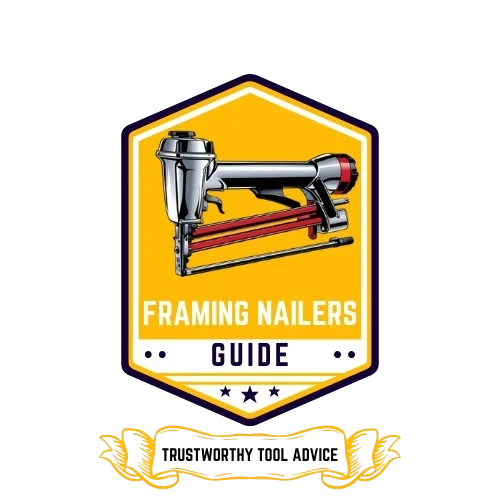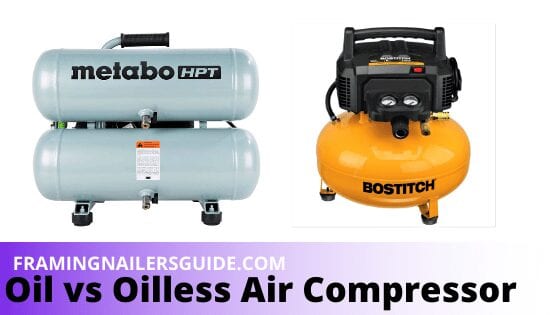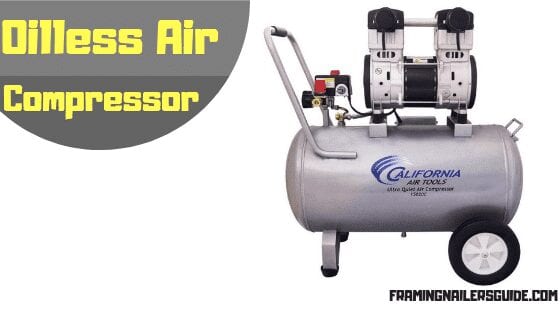Table of Contents
Last Updated on April 16, 2024 by John Patterson
Choosing the suitable compressor for your workshop chores depends on many parameters. And oil and its relevance play a vital role here.
However, there are two types of air compressors based on the oil-filling mechanism–
#1. Oil-based air compressors and
#2. Oilless air compressor/oil-free compressor
And as you’ve landed on this page, we assume you’re confused between oil and oilless air compressor.
So, which one is better? It depends on several variables.
In the first place, it depends on what type of work you are going to do with the aircompressors. Oilless compressors are more of amateur and irregular uses, and oil compressors are for the heavyweight, industrial chores.
So, both can be the cup of your tea to some extent, but you have to choose according to your needs. Make a list of the jobs you will do with an air compressor. Once you can finalize the task list of the compressor, it’s almost done.
Are you done with the list?
Let’s move to the next section to break down the oil vs. oil-free air compressor and decide the right one for you.
Oil vs. Oilless Air Compressor: Comparison
In this oil vs. oilless air compressor guide, we recommend the two best air compressors for your projects.]
The oil air compressor
This type of air compressor is the most favorable, no doubt. But is it really for you?
Let’s have a look at the pros and cons to find out the answer-
-
- Cast-iron metal and extra metal sheets are used to make it durable
- Made to use for commercial purposes.
- The oil-lubricated compressor can serve you for long hours.
- Less noise, so do not bother others.
- Reliable performance.
- No heat issue found while using it regularly.
- The oil-lubricated compressor requires regular maintenance.
- The price tag is very high.
- Lots of parts are used
An oil compressor is a heavy-duty compressor mainly used for industrial and commercial purposes. Let’s have a look at their features and benefits-
Strong Built Quality
An oil air compressor is usually made from cast iron and has a new metal shield to protect its body. So, if something hits the compressor, it will not break easily.
So, these are reliable and last longer. If you are going to use an air compressor for a long time, then an oil-air compressor is the best choice.
Less noise
The oil compressor creates less noise. Less noise is preferable if you live in a populated area because you will not get any noise complaints.
Powerful
Bigger models need more power. An oil compressor is more significant than an oilless compressor. So, it takes more power.
It takes more power to complete a big task. This is a powerful tool that is used for commercial and industrial jobs. Those jobs are heavy indeed. So, you have to have powerful air compressors to complete this job.
In that case, an oil compressor is the only alternative to an oil compressor.
Lasts Longer
The oil compressors last longer. Thanks to its heavy-duty metal body.
Though the metal body makes it heavier, it is well protected. And it is not a problem for industrial use.
You can do all compressed air work with oil-air compressors. There is no limitation like oil-free compressors.
So, you get all the jobs done and a longer lifespan from oil-air compressors.
Performance
It can withstand any severe condition and serve you. You need regular maintenance and changing the oil. You will not face any hassle using it.
You can use oil-air compressors the whole day without getting any heating issues on break.
Weighty product
This is a summary of the oil-air compressors. Uses, lifespan, portability, and durability are the primary concern from my point of view. What do you think?
Yes, it would be best to consider whether it could serve your purpose. And then those factors. So, move to the next section to learn about oil-free compressors, and you will be able to make your decision.
The oilless air compressor
-
- Oil-free air compressors are ideal for home use.
- The lightweight design makes it portable.
- Small in size requires less space.
- Oil-free air compressors are affordable in price. This is great for DIY-ers.
- Fewer amounts of parts are used to make it.
- Quality air to use in sensitive places, such as the food processing area.
- Require less maintenance.
- Oil-free compressors require less power to operate.
- It isn’t quiet.
- Get hotter quickly
- It can break down with a single hit.
What do you think about the term “oilless”? The term oilless is a bit confusing here. It doesn’t mean that it can run without oil. Yes, it still uses oil. But the oils are set and sealed by the manufacturer. That means no oil can evaporate or escapes by other means.
You don’t have to add oil for its lifetime. That’s it. Isn’t it simple?
Let’s have a look at the features and benefits of oil-free compressors-
No maintenance
Compared to oil-air compressors, it requires no maintenance. Its oilless function minimizes the maintenance need.
So, you are getting less hassle to maintain.
Cost-effective
Oil-free air compressors are made for home uses and DIY-ers. And fewer parts are used to make it. There is no extra metal protection. That makes it affordable in price tag.
It is a great advantage for homeowners and DIY-ers as they will not use air compressors heavily.
Related Reading: Air compressors Price.
Portable
You should have the portability option if you are working on small projects in various places.
The oil-free compressors are lightweight. So, it is easy to transport from one place to another.
High Quality of air
This is an oil-free model. There is some sensitive area where the air compressor is used. Such as the food processing area. You can’t use an oil-air compressor because it can release oil with compressed air. However, it is negligible but not acceptable in food processing.
So, oilless air can help you in this regard. Because it does use oil, but the oil is in sealed condition. And its air is free from any harmful objects.
This is a summary of oil-free compressors. You may now understand the term oilless and its uses. You can get this if it matches your requirements.
Are you still confused? Well, read the below section for a head-to-head comparison. I think it will make stuff clear to you.
Oil vs. Oil-Free Air Compressor
Size
Oil compressors are more significant compared to oil-free compressors. And that is why it is more powerful. But not portable.
On the other hand, the oilless one is small and requires less space. You can quickly move it to your project area if you want.
Winner: It depends on your need. Are you a heavy user and going to do jobs only in one place? If yes, go for the oil; otherwise, oilless is best for you.
Cost
We know that oil is more significant and influential. That’s why it is pricier. The minimum price of an oil-air compressor is $600.
On the other hand, an oil-less air compressor can be found at only $200. Indeed it is a low price regarding its versatile works.
Winner: If you compare the price, then oilless is the winner. And if you compare the price with the type of work, then the oil compressor is the winner.
Type of job
What kind of air tool are you going to use?
That is the prime concern. Oil-free compressors can run two nail guns simultaneously. And as I told you previously, it is ideal for home applications.
And oil-based air compressors are for industrial, such as construction jobs. Are you a professional in such a job? Then it is for you.
Winner: It also depends on your job type. So, choose according to your job type.
Build-quality
The oilless compressor can break down quickly, and it does with a single metal hit. As it is built with fewer parts, it happens for that reason.
Comparatively, oil-based is made from cast iron with other metals to protect. Thus, it is durable and excellent in build quality.
Winner: No doubt, an oil-air compressor is a winner.
Uses of power
Oil-based is more considerable and works more big jobs than oilless. So, it will require more power comparatively oilless. However, air compressors are power-hungry machines. It is just a comparative discussion.
Winner: Less power is the winner. So, the oilless compressor is the winner.
Frequently Asked Questions
Question #1: How do oil-less air compressors work?
Answer: Oil-free compressors bring air from outside via an unloaded valve, filtered through an inlet air filter. Then the air is compressed and stored in the tank.
Question #2: Do compressors need oil?
Answer: Of course, an oil-based air compressor needs oil. But an oil-free compressor doesn’t need to add oil from time to time. The oilless is pre-lubed for its lifetime.
Question #3: What oil should I use in my compressor?
Answer: If you own an oil-free compressor, you do not need to add or change the oil.
But for an oil compressor, non-detergent 20 weights or 30-weight oil is recommended.
Question #4: Can you use motor oil in an air compressor?
Answer: Most motor oil is a detergent type of oil. It is because of the safety of engine parts to prevent deterioration. But the air compressor works differently. Detergent oil will cause additives to build up pistons. So, avoid such oil to use.
Question #5: How often should you change compressor oil?
Answer: There are two types of air compressors based on the mechanism, Rotary and reciprocating.
You must change the oil every 8000 hours if it is a rotary screw air compressor. And for the other kind, you should change every 120 days.
In Conclusion
So, you may now well educate yourself about oil vs. oilless compressors.
No matter which type of air compressor you are going to choose. Make sure that it can fulfill your demand.
Many people around us choose the wrong product because of a lack of knowledge. They found that they are wrong after using the product.
So, getting a clear concept about the oil vs. oil-less air compressor and the product you wish to purchase is better.
I hope all the above information can help you find the right product type.
Both types are great for finishing the job accordingly.
If you have still confused about the topic of oil vs. oilless compressor, let us know by commenting here.




